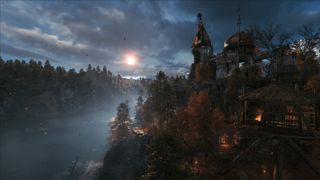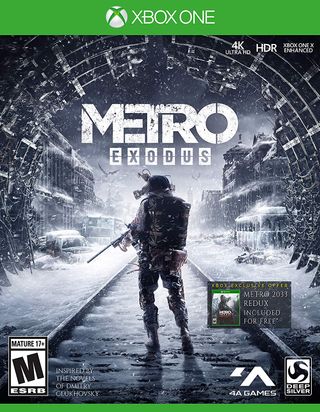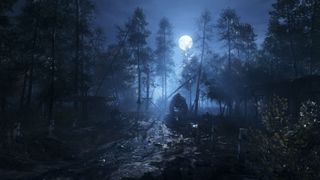Why Metro Exodus world design couldn't (and shouldn't) have been any other way
Metro Exodus has faced criticism from reviewers and fans for its shift to more open world-style environments. Here's why we think this direction was the right call.

Last Friday, Metro Exodus, 4A Games' latest title in its post-apocalyptic shooter series, was released to the world. As expected by many, it garnered tons of acclaim from both critics and fans. However, one common thing a lot of people see as a fault of Exodus is its decision to have a more open-ended, non-linear world design. While I can understand disliking this new direction, I believe that Metro Exodus wouldn't have been as good if it was designed any other way, especially with the story it's trying to tell. Here's why.

Explore a healing world
Metro Exodus is the next game in 4A Games' epic post-apocalyptic shooter series, offering a grand story and a sprawling narrative about exploring a healing world.
Gameplay and story working together

In story-driven games, something that makes or breaks the narrative design is how well what you're doing in the gameplay fits with what you do in cutscenes and the plot. When these two things butt heads and go against each other, it's called "ludonarrative dissonance." A good example of ludonarrative dissonance can be found within the Uncharted series. At the end of Uncharted: Golden Abyss, the main character Nathan Drake exclaims how much it would pain him to leave a man to die. Yet, up until that point, you've been using him to kill hundreds of people and none of it has phased him in the slightest. It doesn't add up.
While this particular example focuses on character traits, the ultimate truth is that everything about a game and its world can influence how gameplay and story mesh together. In Metro Exodus's case, I think the strongest influence is the way the world is physically designed.

Metro's gameplay has always been characterized by its claustrophobic and hyper-linear focus as the protagonist Artyom works his way through Moscow's mutant-infested metro tunnels, trying to make it to his next objective and just barely surviving by the skin of his teeth. The plot compliments this perfectly — Artyom always knows where to go and what to do when he gets there. The struggle to actually get there is where Metro has always shone brightly. Much of the series has always been about the struggle to carve out an existence, rebuilding society whilst hidden away from the radioactive surface and the dangers that lie there.
However, Metro Exodus is different. For the first time in the franchise, the focus shifts from the metro tunnels to the world that lies beyond them. As the characters of the story realize that the world isn't the hopeless wasteland it once was, the narrative turns into a story of exploring a healing world, not hiding away from the horrors of a dead one. And since the story has changed, so too has the world we play in. There are definitely still claustrophobic, linear segments in Exodus, but the main focus of its design is to support that story with non-linear areas that give Artyom and company room to breathe. Without this change, the story and the gameplay experience would be in conflict. After all, a story about exploring the world needs a world to explore, right?
Not entirely unexpected

It's worth highlighting that this direction hasn't come out of left field. It's actually something that the series started to build up to in the previous game, Metro: Last Light. In that game, Artyom spent more time on the surface than he did in the original Metro 2033, and multiple characters remarked how natural events in the game, like the dawn of the spring season and rainfall, were things they never thought they would see again.
Metro: Last Light hinted to us that the world was recovering, and its sequel, Metro Exodus, has capitalized on that setup. So while I can understand fans and critics missing the tight, dreary experience of traversing the metro tunnels, I ultimately think that Metro Exodus has taken the series and brought its gameplay to new heights that mesh perfectly with its writing. Metro's trademark tension and semi-horror atmosphere aren't gone — they're just implemented into a world that trades bleakness and sorrow for hope and recovery.
Get the Windows Central Newsletter
All the latest news, reviews, and guides for Windows and Xbox diehards.
Your thoughts
What do you think about Metro Exodus's open design? Let me know.
Metro Exodus is available now for $60 on Xbox One, or for $50 on PC via the Epic Games Store.

Explore a healing world
Metro Exodus is the next game in 4A Games' epic post-apocalyptic shooter series, offering a grand story and a sprawling narrative about exploring a healing world.
Brendan Lowry is a Windows Central writer and Oakland University graduate with a burning passion for video games, of which he's been an avid fan since childhood. You'll find him doing reviews, editorials, and general coverage on everything Xbox and PC. Follow him on Twitter.

